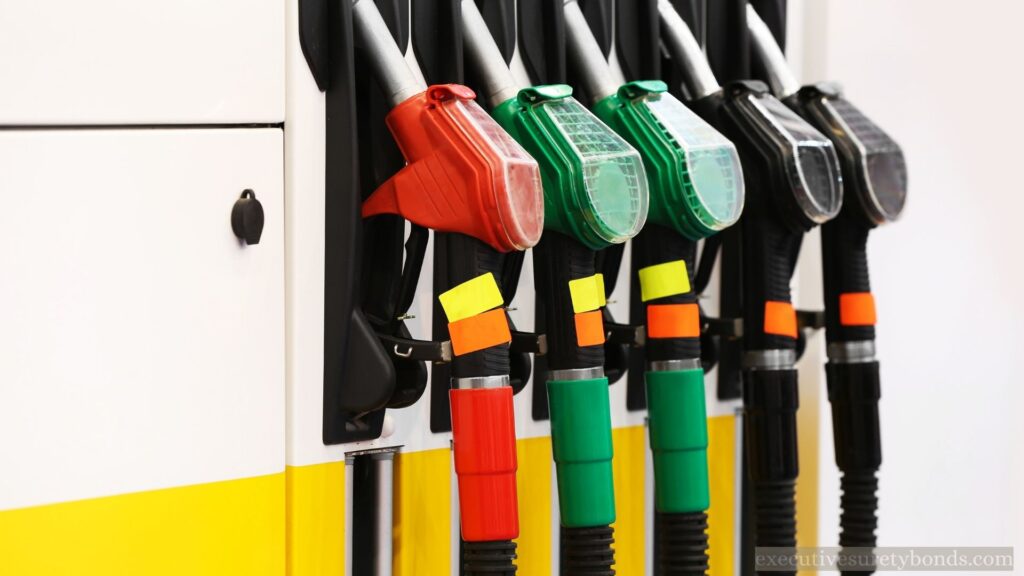Get An Instant Quote on Kansas – Liquid Fuels Carrier ($1,000) Bond Now
Introduction
In the vast expanse of America’s heartland, where transportation is the lifeblood of commerce, the Kansas Liquid Fuels Carrier Bond stands as a pillar of regulatory compliance and financial responsibility. The transportation of liquid fuels, including gasoline, diesel, and other petroleum products, is vital to the state’s economy. The Kansas Department of Revenue ensures that carriers of liquid fuels operate within the bounds of the law and fulfill their tax obligations. This bond serves as a financial guarantee, assuring the state and the public that these carriers will meet their tax liabilities. In this article, we will delve into the significance of the Kansas Liquid Fuels Carrier Bond, its purpose, and its impact on the transportation industry and state revenue.
The Role of Liquid Fuels Carriers in Kansas
Liquid fuels carriers in Kansas play a pivotal role in the distribution of petroleum products to various industries and consumers. They transport fuels to gas stations, agricultural operations, manufacturing facilities, and more. The efficient movement of liquid fuels is essential to keeping the state’s economy running smoothly.
The Kansas Liquid Fuels Carrier Bond
At the core of liquid fuels transportation in Kansas lies the Kansas Liquid Fuels Carrier Bond. This bond is not merely a regulatory requirement; it is a fundamental instrument used by the state to ensure that carriers of liquid fuels fulfill their tax obligations and operate responsibly.
Understanding the Mechanics of the Bond
When an entity becomes licensed as a liquid fuels carrier in Kansas, they are typically required to obtain the Kansas Liquid Fuels Carrier Bond. This bond serves as a binding agreement between the licensed carrier, the state, and a surety company. The surety company provides financial assurance to the state, guaranteeing that the carrier will pay all applicable fuel taxes promptly and in compliance with state regulations.
Implications for Liquid Fuels Carriers
For liquid fuels carriers in Kansas, securing the Kansas Liquid Fuels Carrier Bond signifies a commitment to financial responsibility and regulatory compliance. It ensures that they adhere to state tax laws, accurately report fuel usage, and promptly remit the required fuel taxes.
Moreover, the bond enhances trust and confidence among the state government and the public. It signifies that liquid fuels carriers are financially responsible and dedicated to supporting the state’s revenue collection efforts.
Contributing to State Revenue and Infrastructure
The primary purpose of the Kansas Liquid Fuels Carrier Bond is to contribute to state revenue and infrastructure development. By ensuring that carriers fulfill their tax obligations, the bond plays a vital role in funding critical state projects, including the maintenance and construction of highways and transportation infrastructure. It supports the state’s ability to invest in the transportation systems that keep commerce flowing.
Conclusion
In the realm of liquid fuels transportation and state revenue collection in Kansas, the Kansas Liquid Fuels Carrier Bond is not just a legal requirement—it is an essential tool for fostering trust and financial responsibility. Liquid fuels carriers, the state government, and the public benefit from the protections and assurances provided by this bond. By enforcing compliance with tax regulations and promoting accountability in fuel tax collection, the bond plays a pivotal role in sustaining the flow of liquid fuels and the economic vitality of the Sunflower State.
Frequently Asked Questions
Can a Liquid Fuels Carrier Obtain Multiple Bonds for Different Types of Fuels, Such as Gasoline and Diesel, or is One Bond Sufficient for All Fuel Types?
In most cases, a single Kansas Liquid Fuels Carrier Bond is typically sufficient to cover all types of liquid fuels that a carrier transports, including gasoline, diesel, and other petroleum products. The bond is designed to ensure compliance with state tax regulations for all fuel types. However, if a carrier is engaged in the transportation of various types of hazardous materials or other specialized fuels, they may need to comply with additional state or federal bonding requirements specific to those materials. It’s essential to consult with the Kansas Department of Revenue or relevant regulatory authorities for precise guidance based on the carrier’s operations.
Is the Kansas Liquid Fuels Carrier Bond Amount Fixed at $1,000, or Can it Vary Based on the Carrier’s Volume of Fuel Transported?
The bond amount for the Kansas Liquid Fuels Carrier Bond is typically fixed at $1,000 for all carriers, regardless of the volume of fuel they transport. Unlike some other types of bonds, such as performance bonds, which can vary based on project size or contract value, the bond amount for liquid fuels carriers is typically standardized by the state. This fixed amount serves as financial assurance for compliance with state tax obligations rather than being tied to the scale of operations.
Can a Liquid Fuels Carrier Use the Kansas Liquid Fuels Carrier Bond to Cover Unrelated Financial Obligations, Such as Maintenance Costs or Vehicle Repairs?
No, the Kansas Liquid Fuels Carrier Bond is specifically designed to cover fuel tax obligations and related tax liabilities. It is not intended to be used to cover unrelated financial obligations, such as vehicle maintenance costs or repairs. Attempting to use the bond for unrelated purposes could lead to legal and financial consequences. Liquid fuels carriers should ensure that they have appropriate insurance or financial arrangements in place to address non-tax-related expenses associated with their operations.


